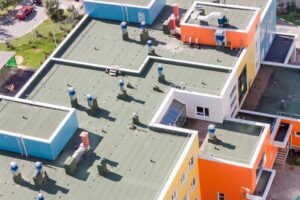
In Mooreville, commercial buildings are no stranger to the benefits and challenges of flat roofing systems. Understanding the intricacies of these roofing systems is crucial for property owners and managers to make informed decisions about their maintenance and repair. This article aims to provide a comprehensive overview of Mooreville commercial flat roofing, covering key components, types of roofs, advantages, challenges, materials, and the importance of hiring a professional roofing contractor.
Understanding Flat Roofing Systems
Key Components of Flat Roofs
A flat roofing system is a complex structure that requires various components to work together seamlessly in order to provide reliable protection against the elements. Each component plays a crucial role in ensuring the longevity and performance of the roof. In addition to the basic components mentioned, there are other elements that are equally important:
- Flashing: Used to seal joints and edges to prevent water infiltration.
- Roof Coating: Applied to the surface of the roof for additional protection against UV rays and weather damage.
These additional components enhance the overall performance and durability of the flat roof, making it more resilient to harsh weather conditions and wear over time.
Types of Commercial Flat Roofs
When it comes to commercial buildings, there are several types of flat roofs that are commonly used, each offering unique advantages and characteristics:
- Built-Up Roofing (BUR): This traditional roofing system is known for its reliability and longevity, making it a popular choice for commercial properties.
- Modified Bitumen Roofing: With its blend of asphalt and rubber modifiers, this type of roof offers exceptional flexibility and resistance to extreme temperatures.
- Single-Ply Roofing: Known for its ease of installation and energy efficiency, single-ply roofing systems are a cost-effective option for many businesses.
- Metal Roofing: Highly durable and low-maintenance, metal roofs are ideal for buildings that require long-term performance and protection.
- Green Roofing: An environmentally friendly option that involves the installation of vegetation on the roof surface, providing insulation and reducing energy costs.
Each type of flat roof has its own set of advantages and considerations, allowing building owners to choose the best option based on their specific needs and budget constraints.
Benefits of Flat Roofing for Commercial Buildings
Space Utilization and Accessibility
One of the significant advantages of flat roofs in commercial buildings is their potential for enhanced space utilization. Unlike pitched roofs, flat roofs offer usable space that can be utilized for storage or recreational purposes. Additionally, flat roofs make it easier to install equipment like HVAC systems or solar panels, improving the building’s functionality and energy efficiency.
Moreover, the flat roof design provides an opportunity for creating rooftop gardens or outdoor seating areas, adding aesthetic value to the building and creating green spaces in urban environments. These areas can serve as relaxation spots for employees or customers, contributing to a healthier and more enjoyable work environment.
Cost-Effectiveness and Energy Efficiency
Flat roofing systems typically require fewer materials and less complex installation processes compared to pitched roofs. This factor contributes to cost savings during construction or roof replacement projects. Moreover, flat roofs allow for easier installation of insulation, promoting energy efficiency and reducing heating and cooling costs over time.
Another aspect of energy efficiency with flat roofs is the potential for incorporating cool roof technologies. These reflective materials help reduce heat absorption, lowering indoor temperatures and decreasing the demand for air conditioning, especially in warm climates. This sustainable feature not only benefits the building occupants but also contributes to environmental conservation by reducing carbon emissions associated with excessive energy consumption.
Common Challenges with Flat Roofs
Drainage Issues and Water Pooling
One of the primary challenges associated with flat roofs is the potential for drainage issues and water pooling. Without proper installation of drainage systems, water can accumulate on the roof, leading to leaks, structural damage, and other costly problems. Regular maintenance and swift repair of any drainage issues are crucial for preserving the integrity of the flat roof.
Furthermore, inadequate drainage can also result in the formation of ice dams during colder months, which can further exacerbate water pooling issues. Ice dams form when melted snow refreezes at the roof’s edges, creating blockages that prevent proper drainage. This can lead to water seeping under shingles, causing interior damage and compromising the roof’s structure.
Maintenance and Repair Considerations
Flat roofs require regular maintenance to ensure their longevity and performance. As a property owner or manager, it is essential to schedule routine inspections and address any issues promptly. Common maintenance tasks include removing debris, inspecting the waterproof membrane, and repairing any damages or leaks. Regular maintenance helps prevent major problems and extends the lifespan of the flat roof.
In addition to routine maintenance, it is crucial to consider the impact of weather conditions on flat roofs. Extreme heat, UV exposure, heavy rainfall, and snow accumulation can all take a toll on the roof’s materials over time. Monitoring the roof’s condition throughout the year and conducting seasonal maintenance can help mitigate the effects of weather-related wear and tear, ensuring the roof remains durable and watertight.
Choosing the Right Material for Your Flat Roof
Comparing Durability and Lifespan
When selecting a material for your flat roof, durability and lifespan are critical factors to consider. Metal roofing, for example, offers exceptional longevity and can withstand harsh weather conditions. Single-ply roofing materials like PVC and TPO are known for their resistance to UV rays and punctures. Assess your building’s specific needs and consult with a professional roofing contractor to determine the most suitable material for your flat roof.
Weather Resistance and Insulation Properties
Mooreville experiences a range of weather conditions throughout the year, including heat, humidity, and occasional severe storms. Therefore, it is important to choose a flat roofing material that offers excellent weather resistance and insulation properties. Materials like modified bitumen and single-ply membranes provide reliable protection against moisture, temperature fluctuations, and UV radiation, ensuring the longevity of the roof and the comfort of the building’s occupants.
Hiring a Professional Roofing Contractor in Mooreville
Qualities to Look for in a Roofing Contractor
When it comes to flat roofing projects in Mooreville, it is crucial to partner with a reputable and experienced roofing contractor. Consider the following qualities when selecting a contractor:
- License and Insurance: Ensure the contractor holds the necessary licenses and insurance to protect both parties involved.
- Track Record: Look for a contractor with a proven track record of successfully completing flat roofing projects in Mooreville.
- References and Reviews: Check for testimonials and online reviews from previous customers to gauge the contractor’s reputation.
- Warranty and Maintenance: Inquire about the contractor’s warranty on materials and workmanship, as well as any maintenance services offered.
The Importance of Local Expertise and Experience
Choosing a roofing contractor with local expertise and experience can provide numerous benefits. Local contractors understand Mooreville’s climate and building codes, enabling them to select the most suitable materials and install the flat roof according to the local regulations. Additionally, local contractors are readily available for ongoing maintenance and any potential repair needs that may arise in the future.
In conclusion, Mooreville commercial flat roofing offers numerous advantages for property owners, such as increased space utilization, cost-effectiveness, and energy efficiency. However, it is crucial to address common challenges, including drainage issues and regular maintenance. Choosing the right material and hiring a professional roofing contractor with local expertise and experience are essential steps to ensure the longevity and performance of your flat roof.
Ready to ensure your Mooreville commercial property is equipped with a top-tier flat roofing system? Look no further than Commercial Roofing Rana, your trusted partner in the Mid-South for all your commercial roofing needs. With our expertise in Duro-Last roofing systems, we provide tailored solutions that offer superior protection against the elements. Serving a diverse range of commercial clients since 1983, our licensed professionals are committed to excellence and durability. Don’t let water damage threaten your business—Schedule Now! and let us secure your investment with quality craftsmanship and unparalleled service.
